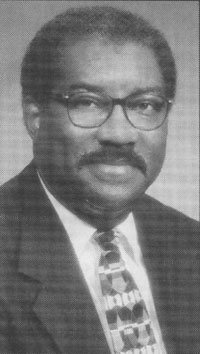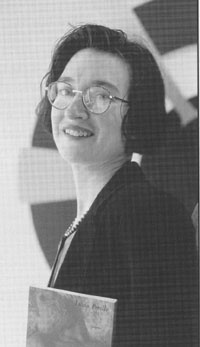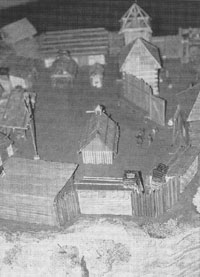PEOPLE
Edited by Rodd Whelpley
BIG PEOPLE ON CAMPUS

Photograph courtesy of Southern Illinois University
James E. Walker
James E. Walker,
who began his
career in higher
education as an
assistant profes-sor
at Southern
Illinois University
at Edwardsville, is
set to become
president of SIU
October 1.
Walker has been
president of Middle Tennessee State
University since 1991.
George T. Wilkins left his seat on the
SIU Board of Trustees. Wilkins was
appointed to the board as a Democrat,
but this spring drew criticism from
some student protesters who contend-ed
that his recent primary voting
record was Republican, violating
the requirement that the board have
balanced party representation.
Wilkins, who has a home in Indiana,
resigned shortly after a law took effect
that requires trustees to live in the
state. He had been on the board since
1979.
The former chancellor of SIU-Carbondale
wants her old job back.
Jo Ann Argersinger filed a federal suit
last month against current and former
SIU administrators. She is seeking rein-statement
and damages, claiming that
her free speech rights were violated
because she was dismissed for pointing
out improprieties in insurance billings
and contract awards at the school.
Argersinger was removed from the
chancellor's position in 1999 and
returned to her tenured teaching
position in the history department.
She also maintains that she was
dismissed without due process and that
her recent pay cut is discriminatory
because other administrators have
returned to the faculty at their
administrative salaries.
|
APPOINTMENT
Gov. George Ryan appointed former state Rep. Pete Peters
of Chicago to chair the Illinois Clean Energy Community Trust. The panel
oversees a more than $200 million trust created in 1999 as a condition of
Commonwealth Edison's sale of its coal-fired plants to a California company.
The trust is designed to help fund clean coal and renewable energy initiatives.
Some of the dollars will be designated for the Illinois Citizens Utility Board.
Peters' appointment does not require Senate confirmation. He will receive an
annual salary of $25,000 for the position.
U of I prof pioneers home-grown soy snacks
If Richard Bernard has his way, snack food addicts may soon have a new alternative
to beer nuts. That's because the Japanese snack of cooked soybeans is catching on in
this country and this University of Illinois professor emeritus has made it easier for
backyard gardeners to grow the nutritional food.
Bernard, a plant breeder at the university's National Soybean Research Lab, has
developed six varieties of garden soybeans for harvesting as a table vegetable. "We had
over 1,200 requests for the seeds. We ran out and had to take names," he says.
Asians have been eating soybeans as vegetables for more than 2,000 years, says
Bernard, but Americans think of them more as an industrial product. The Asian
soybean, which tends to be bigger and tastier, does not produce well in the Illinois
climate, nor does it have resistance to Illinois insects and diseases. Through crossbreed-ing
with local beans, Bernard developed varieties that are at least 50 percent larger
and, in some cases, twice as large as Illinois beans. Shiny green with a nutty taste, the
soybeans are cooked in the pod, then shelled like peanuts and eaten cold or hot.
"They are easier to cook, easier to digest and have the highest amount of protein
of any bean," says Bernard, who hopes some private seed company might take over
marketing and distribution.
Scandal by the number
Dean Bauer, the former inspector general under Secretary of State George Ryan,
pleaded not guilty last month to new federal charges that he failed to investigate allega-tions
of corruption in that office. Bauer's case is expected to go to trial in early December.
Federal authorities also charged five more driving school instructors with paying
bribes to state employees. The two-year-old Operation Safe Road bribes-for-licenses
investigation is ongoing.
Number of people charged in Operation Safe Road: . . . . . . . . . . . . . . . . . . . . . . . . . .37*
Number of people who have pleaded guilty: . . . . . . . . . . . . . . . . . . . . . . . . . . . . . . . . . .27
Number of people convicted in contested cases: . . . . . . . . . . . . . . . . . . . . . . . . . . . . . . .1
Number of people sentenced: . . . . . . . . . . . . . . . . . . . . . . . . . . . . . . . . . . . . . . . . . . . . . .17
*All figures as of mid-August
Another bribes-for-licenses investigation heated up this summer, this time at the
Waterloo and Jerseyville licensing facilities in southern Illinois. Federal investigators
there have charged Gay Lynn Wielgus of Belleville and Michael A. Fahey Sr. of Bunker
Hill with taking bribes for improperly passing applicants for truck driver's licenses.
Former secretary of state employee Wielgus transferred to the Illinois Department
of Transportation in May. Fahey is on unpaid leave. The Wielgus indictment charges that
she granted licenses to some applicants after they made political contributions.
|
36 . September 2000 Illinois Issues www.uis.edu/~ilissues --- 
Q & A Question & Answer
Lucia Perillo
The 41-year-old Southern Illinois University associate English professor
recently received the illustrious John D. and Catherine T. MacArthur Founda-tionís
genius grant, which awards a $500,000 no-strings-attached prize. Perilloís
poetry has been published in magazines, such as The Atlantic Monthly, and in
books. Random House published her latest: The Oldest Map with the Name
America. The assistance comes at a fortuitous time for Perillo, who is facing an
intensified struggle with multiple sclerosis, a disease that has often been the
subject of her poetry.
from The Body Mutinies
When the doctor runs out of words and still I won't leave,
he latches my shoulders and streers me out doors. Where I see his blurned hand
through the milk glass, flapping goodbue like a sail
Perillo has taken a leave from Southern Illinois and is living in Olympia,
Wash., where she taught prior coming to the Carbondale campus in 1991.

Photograph courtesy of Southern Illinois University
Q. Before you taught English
you worked as a naturalist.
How did you come to make the
transition?
I worked for the U.S. Fish and
Wildlife Service after I graduated. I
was working in the San Francisco
Bay National Wildlife Refuge, and
when I was there I started to take
poetry classes [at San Jose State] with
Robert Hass, who would subsequent-ly
be [the U.S.] poet laureate. I went
back to school and was exposed to a
number of poets. After graduate
school, I kept doing that [writing]
and ended up in a teaching job.
Q. Is there a connection between
poetry and the wild? Does nature
figure prominently in your work?
It didnít in the old days. It does
more and more now. In the beginning
I was interested in social con-cerns.
Iím always interested in nature
in poetry as it relates to the human
condition. The core of my second
book [The Body Mutinies] has to do
with the body. Iíve always written
with the body in mind. Thatís where
my naturalist background comes
into play.
Q. Do you think of yourself as a
writer or a teacher?
I think of myself as more of a
writer. I think most writers want to
be writing. I know Iíve learned so
much from teaching. My knowledge
of poetry has been enhanced. I guess
I never thought writing would be my
profession. I feel very lucky Iíve been
able to have the amount of time Iíve
had to write. I know there are many
writers who canít get that.
Q. What is in your future? What
will the award allow you to do?
I was planning to take some time to
address my health concerns. The award
will let me do that. [With the job at
SIU], my husband and I have lived
apart for the last decade. Domestically,
there will be more harmony and
commuting wonít eat up all my time.
Q. What goals do you hope to
achieve?
I hope to get settled back into
writing soon. I have tons of stuff Iíve
tucked in boxes. I want to work on
my short stories and nonfiction.
Q. Arenít you young to have
accomplished so much?
My sense of it is they used to give
these awards to people who were
more at the peak of their professions,
people who were older. I noticed
with this yearís awards there were a
lot of younger people. I think it is a
good thing they are looking to
younger people, people who have not
yet reached the pinnacle of their
careers and could really use financial
assistance.
Maureen Foertsch McKinney
www.uis.edu/~ilissues Illinois Issues September 2000 . 37 --- 
PEOPLE
OBIT
William Maxwell
Celebrated native Illinois writer
William Maxwell died July 31 at the
age of 91.
"We tend to talk about him as an
Illinois writer. He is one of the finest
writers Illinois has ever produced, but
his body of work is important on a
national and international level," says
Barbara Burkhardt, who turned her
critical biography of Maxwell over to
an agent just two weeks before the
writer's death.
Illinois, primarily downstate
Lincoln, often served as the backdrop
for Maxwell's books, including the
American Book Award-winning So
Long, See You Tomorrow, a 1980
novel set in 1920 that explores a
scandalous murder and its effects on
the friendship of two boys.
"He has called Illinois 'his
imagination's home,'" Burkhardt
says. "Maxwell captured both the
provincial nature of the small town in
Illinois as well as the beauty of his life
there."
Lincoln also played a role when
Maxwell chronicled his mother's death
during the 1918 influenza epidemic in
his 1937 novel They Came Like
Swallows. Maxwell's family moved to
Chicago after his mother's death,
which is mirrored in the action of his
1945 tale of youthful friendship, The
Folded Leaf.
Though Illinois figured prominently
in Maxwell's fiction, work drew him to
the East Coast, where he served as a
fiction editor for The New Yorker
magazine for 40 years and worked
with writers John Cheever, John
Updike and Vladimir Nabokov.
"I think with his death, his fiction
will come to be known as his greatest
contribution to American letters," says
Burkhardt, who hopes her biography
will advance Maxwell's stature as a
fiction writer. "His fiction has been
unrecognized in his lifetime, I believe."
Maxwell's death came eight days after
the death of Emily, his wife of 55
years.
|

Photograph courtesy of IMSA
School projects
Claiborne Skinner, social science teacher at the Illinois
Mathematics and Science Academy in Aurora, supervised the
construction of this diorama of Fort St. Louis des Illinois,
Franceís westernmost outpost from 1682 to 1691. For more
than three years, his students researched and built the fort,
the site of a 10-day battle between the Iroquois, French
officers and Illiniwek that ended in the defeat of the
Iroquois, a prelude to the French and Indian War. It marked a
turning point in the history of colonial America. The fort is
on permanent display at Starved Rock State Park in Utica.
Arlington track on the block
A $100 million offer to buy the stateís premier horse racing venue has a legislator
calling for a second look at the controversial 1999 gambling law.
Richard Duchossois agreed to sell Arlington International Racecourse this summer
to Louisville, Ky.-based Churchill Downs Inc., owner of the home turf of the
prestigious Kentucky Derby race. After the announcement, Rep. Jeff Schoenberg
questioned whether Duchossois had planned the deal as he lobbied for passage of the
gambling measure. The measure, since signed into law, will cut the owners of horse
racing tracks in on tax revenue expected from a new riverboat gambling venue law-makers
designated for Cook County. ďThis taxpayer subsidy significantly boosted the
value of Arlington and gives [Duchossois] a considerable windfall,Ē says Schoenberg.
ďNo legislators were aware that the bill would boost profits from a subsequent sale.Ē
The Evanston Democrat is chair of the House Appropriations Committee. He says he
may hold hearings to investigate the timing of the takeover. Duchossois had closed the
track in 1997, saying competition from the burgeoning casino business made it unprof-itable.
News of its sale came after Arlington reopened on Mothers Day, when about
32,000 well-wishers, including Gov. George Ryan, showed up to try their luck at the
ponies. An Arlington spokesman says the sale is part of an ongoing consolidation in
the racing industry. Still, if approved by the Illinois Racing Board, this could be a gam-ble
that goes sour for Duchossois. Some of his take depends on the opening of a casi-no
in Cook County, and that remains in limbo due to two continuing lawsuits.
Edgar-era scandal still has legs
Two judicial rulings revived the ghost of Management Services of Illinois Inc.
ē The five unindicted co-conspirators in the MSI Inc. contract scandal were named
after a ruling by the U.S. Court of Appeals for the Seventh Circuit. They are Michael
Belletire, former Gov. Jim Edgarís deputy chief of staff; Janis Cellini, who was Edgarís
personnel director; Jim Owen, former assistant to Senate President James ďPateĒ
Philip; and Terry Bedgood and Terry Logsdon, aides to former Gov. James Thompson.
The Illinois Press Association, The Associated Press, the Chicago Tribune and Copley
Press Inc. sued to make the names public because statements from some of them
became evidence in the trial of James Berger, a Department of Public Aid admin-istrator
charged with helping to defraud the state. Berger was acquitted. The U.S.
attorneyís office had argued releasing the names could unfairly burden the five because
they hadnít been charged with a crime and had no chance to clear their names legally.
ē U.S. District Judge Richard Mills reduced the restitution Michael Martin and
Ronald Lowder owe the state from $12.3 million to $172,000. Mills held prosecutors
didnít prove Martin and Lowderís actions cost the state any more than that. The
two were convicted in the 1997 investigation of a contract between the public aid
department and MSI Inc., a Springfield-based data management company.
|
38 . September 2000 Illinois Issues www.uis.edu/~ilissues --- 
|Home|
|Search|
|Back to Periodicals Available|
|Table of Contents|
|Back to Illinois Issues 2000|
Illinois Periodicals Online (IPO) is a digital imaging project at the
Northern Illinois University Libraries funded by the Illinois State Library
Sam S. Manivong, Illinois Periodicals Online Coordinator
|
|

